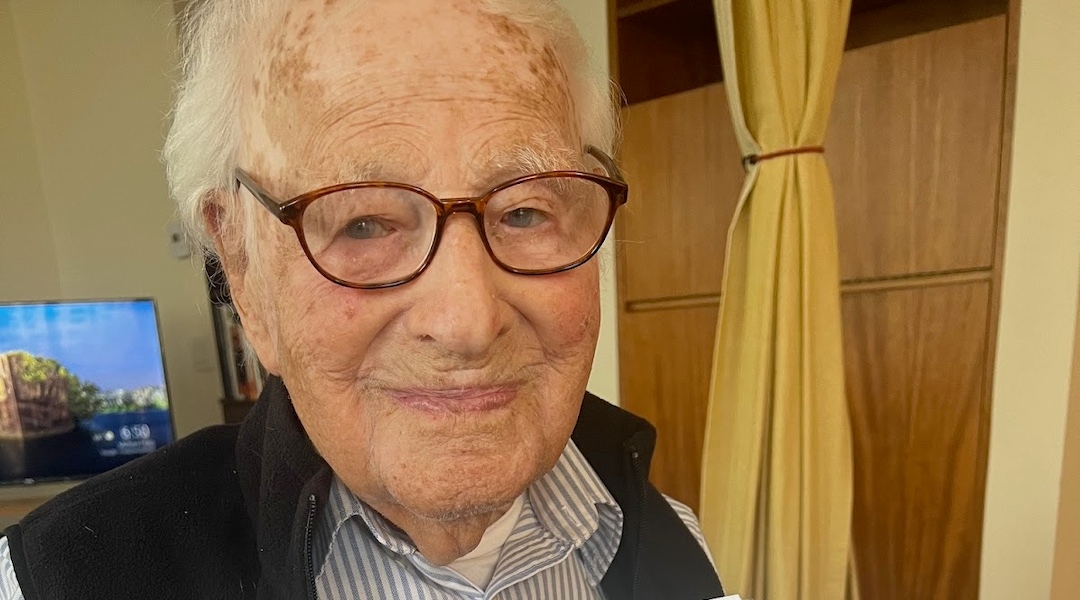Morrie Markoff, Jewish supercentenarian and oldest man in U.S., dies at 110
Markoff became a prolific blogger after 105, titling one post about his long life “Bashert,” Yiddish for “fate”

Morrie Markoff in 2023. (Courtesy The Brain Donor Project)
Morrie Markoff, who was born to Jewish parents in an East Harlem tenement in 1914 and lived to become what was believed to be the oldest man in the United States, died June 3 at his home in Los Angeles. He was 110.
Markoff’s remarkable lifespan was matched by his remarkable lucidity: After he turned 100, Markoff became an avid blogger and author and saw his scrap metal sculpture exhibited at a Los Angeles gallery. His memoir, “Keep Breathing: Recollections from a 103-year-old,” was published in 2017.
The Brain Donor Project, a nonprofit organization that supports the National Institutes of Health NeuroBioBank, said that once donated Markoff’s is likely to be the oldest brain registered and collected without pathological cognitive decline.
“He published a book and blog, but now he’s going into the annals of scientific research,” his daugher, Judith Hansen, 81, said in a statement shared by The Brain Donor Project. “This is just right up his alley. He loved science. He, with his eighth-grade education, used to read Scientific American — and discuss it with friends. He did love science.”
Markoff was born in New York City on Jan. 11, 1914, one of four children of Max and Rose Markoff, Jewish immigrants from Russia. He survived the 1918 Spanish Flu pandemic, which claimed the life of a brother. He attended school through the eighth grade before training as a machinist.
“I am Jewish and my parents were religious (but not fanatically so),” he wrote in a blog post in 2021. “On ‘High holidays’ they sent me to the local synagogue. On Friday night, my mother said Jewish prayers. I went to the neighborhood Hebrew school until the age of 13. When I was 13, I had a Bar Mitzvah — I became an adult.”
In the late 1930s, Markoff moved to Los Angeles where he worked for a vacuum cleaner company, as a machinist for a defense contractor making artillery shells and as a partner in a series of small-appliance businesses.
He and Betty Goldmintz were married on Nov. 4, 1938 and remained together for 81 years, until her death in 2019.
In that same 2021 blog post, Markoff contemplated his long life. “I have had many close calls, escapes from death. Never did I ever expect to reach the age I am, and to still have my marbles,” he wrote. “Just good luck. Some people have it, some don’t. Some believe our lives are preordained (meant to be). Perhaps. Who is to say.”
The post took its title from “bashert,” a Yiddish word meaning “fate.”
As of April, Guinness World Records listed John Alfred Tinniswood, 111, of England, as the world’s oldest man, and María Branyas Morera, 117, a California native who lives in Spain, as the oldest woman. In February, Pearl Berg, thought to be the oldest Jewish person in the world and the third oldest American at the time, died in Los Angeles. She was 114.
Markoff’s survivors include his daughter and a son, Steven; five grandchildren, and three great-grandchildren.
This article originally appeared on JTA.org.
A message from our Publisher & CEO Rachel Fishman Feddersen

I hope you appreciated this article. Before you go, I’d like to ask you to please support the Forward’s award-winning, nonprofit journalism so that we can be prepared for whatever news 2025 brings.
At a time when other newsrooms are closing or cutting back, the Forward has removed its paywall and invested additional resources to report on the ground from Israel and around the U.S. on the impact of the war, rising antisemitism and polarized discourse.
Readers like you make it all possible. Support our work by becoming a Forward Member and connect with our journalism and your community.
— Rachel Fishman Feddersen, Publisher and CEO


























